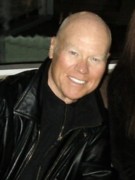A Quote by Stephen Covey
Management is clearly different from leadership. Leadership is primarily a high-powered, right-brain activity. It's more of an art it's based on a philosophy. You have to ask the ultimate questions of life when you're dealing with personal leadership issues.
Related Quotes
Control is not leadership; management is not leadership; leadership is leadership is leadership. If you seek to lead, invest at least 50% of your time leading yourself-your own purpose, ethics, principles, motivation, conduct. Invest at least 20% leading those with authority over you and 15% leading your peers. If you don't understand that you work for your mislabeled 'subordinates,' then you know nothing of leadership. You know only tyranny.
Leadership can't be claimed like luggage at the airport. Leadership can't be inherited, even though you may inherit a leadership position. And leadership can't be given as a gift - even if you've been blessed with an abundance of leadership skills to share with someone else. Leadership must be earned by mastering a defined set of skills and by working with others to achieve common goals.
Leadership is much less about what you do, and much more about who you are. If you view leadership as a bag of manipulative tricks or charismatic behaviors to advance your own personal interest, then people have every right to be cynical. But if your leadership flows first and foremost from inner character and integrity of ambition, then you can justly ask people to lend themselves to your organization and its mission.
Leadership is not so much about technique and methods as it is about opening the heart. Leadership is about inspiration-of oneself and of others. Great leadership is about human experiences, not processes. Leadership is not a formula or a program, it is a human activity that comes from the heart and considers the hearts of others. It is an attitude, not a routine.
I often ask myself: "What would Theodore Roosevelt do?" One can never know, of course. The ultimate contribution of consequential leaders is often their capacity to reframe issues in novel ways. That said, his leadership engaged, at a foundational level, whether the American "national character" would accept decline and mediocrity, or would go all-in for leadership and excellence. Amid the myriad of otherwise disconnected issues before us, that choice is emerging yet again.
Stress on fast growing companies comes from a lot of different places. The one that is often the largest, and creates the most second-order issues, is the composition of the leadership team. More specifically, it's specific people on the leadership who don't have the scale experience their role requires at a particular moment in time.
I decided to write Leadership BS because I was irritated by the hypocrisy in the leadership literature and the fact that many of the people writing leadership books exhibited behavior that was precisely the opposite of what they advocated and also what they claimed they did. Stories did not seem to be a good foundation on which to build a science of leadership.





































